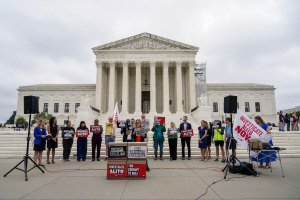
Perhaps the most surprising thing about the Christian Nationalist flag flying outside Supreme Court Justice Samuel Alito’s vacation house is that anyone was surprised by what the flag indicated about Alito’s political ideology.
That a Supreme Court justice would have two partisan flags representing anti-democratic movements displayed outside his homes, especially while he’s deliberating cases involving people active in those movements, is alarming. But that one of those flags signals that Alito has Christian Nationalist sympathies that run contrary to the constitutional promise of church-state separation shouldn’t come as a shock to anyone who has paid attention to his judicial opinions and public remarks.
“A quick review of Alito’s opinions, particularly over the last decade, confirms this is just the latest sign of his commitment to advancing Christian nationalism,” wrote AU President and CEO Rachel Laser in an op-ed distributed by The Progressive Magazine. “He has repeatedly wielded his power as a Supreme Court justice to achieve Christian nationalist goals —gutting abortion rights and rolling back access to contraception, limiting LGBTQ+ rights, imposing Christianity on public school students and taxpayers, and devastating our Constitution’s promise of church-state separation.”
In early May, The New York Times broke the news that an upside-down American flag was displayed outside Alito’s Virginia home in early 2021. That timing coincided with supporters of former President Donald Trump using the upside-down flag as a symbol of their mistaken belief that the presidential election had been stolen from Trump.
Later in May, The Times reported another flag associated with this anti-democratic movement was flown outside another Alito home. The “Appeal to Heaven” flag, which has been co-opted by Christian Nationalists in recent years, was seen outside Alito’s New Jersey beach house last summer (for more on the flag’s Christian Nationalist connections, see “Supreme symbolism: Why Alito’s embrace of controversial flags matters”.)

Alito has blamed his wife, Martha-Ann Alito, for both flag displays and refused to recuse himself from the decisions of two pending Supreme Court cases that involve efforts to overturn the 2020 presidential election. One case aims to throw out the obstruction charges brought against insurrectionists who stormed the U.S. Capitol on Jan. 6, 2021, in an effort to stop Congress from certifying election results. The other case involves whether Trump should have immunity from prosecution on charges that he conspired to overturn the election results. Decisions in both cases were expected by the end of June and had not yet been announced at Church & State’s press time.
Chief Justice John Roberts refused to meet with members of Congress to discuss the flag displays and other Supreme Court ethics controversies, including revelations that Justice Clarence Thomas repeatedly hasn’t disclosed financial favors. Senate Republicans in June blocked a Supreme Court ethics reform bill.
Americans United has called for Congress to take action. “That this partisan Christian Nationalist flag flew at the beach house of a Supreme Court justice raises serious questions about impartiality and the fair administration of justice at the nation’s highest court,” Laser said in a media statement. “Congress must hold hearings to assure the American people that Justice Alito will honor his oath of office and put the Constitution first, before the tenets of the Christian Nationalist movement.”
Alito’s hostility toward church-state separation has been evident for much of his career: When he was nominated to the Supreme Court in 2005, AU urged senators to vote against his confirmation because there was “no doubt that if given the opportunity, Alito will knock down decades of precedent, including federal court rulings that have protected religious liberty for all Americans.”
Among the evidence AU pointed to was Alito’s 1985 job application to become deputy assistant attorney general in the Reagan administration. Alito wrote that he disagreed with many Supreme Court decisions reached during the period that Chief Justice Earl Warren led the court, “particularly in the areas of criminal procedure, the Establishment Clause, and reapportionment.” Two major church-state cases decided during Warren’s reign include Engel v. Vitale and Abington v. Schempp, which ended both school-sponsored prayer and forced Bible reading in public schools.
In the nearly 20 years since he joined the Supreme Court bench, Alito has steadily chipped away at the Establishment Clause (the First Amendment’s mandate that government must not favor one religion over others, or religion over non-religion) while bolstering Free Exercise Clause claims, especially those brought by conservative Christians, even when those claims could cause harm to others.
A prime example was the 5-4 majority opinion Alito wrote in the Hobby Lobby v. Burwell case in 2014, which granted corporations and other employers the right to weaponize religious freedom and deny workers access to birth control as required by the Affordable Care Act. In the opinion – the first to assign religious beliefs to corporations – Alito gave credence to business owners’ incorrect views that contraceptives are abortifacients and therefore violated the owners’ anti-abortion religious beliefs.
Eight years later, Alito led an even more devastating attack on reproductive rights when he wrote the majority opinion that overturned Roe v. Wade and abolished the nationwide right to abortion. In the two years since the Dobbs v. Jackson Women’s Health Organization decision, legislators in nearly half of U.S. states have imposed one narrow religious view on people by banning or severely restricting abortion access.
Alito “wrote in the opinion that abortion is a ‘moral’ decision — one that he and the rest of the conservative justices should have left to individuals to make based on their own beliefs about what’s best for their own bodies,” Laser noted in her Progressive column. “Alito imposing his personal morality on all of us is the opposite of religious freedom.”
LGBTQ+ rights also have often been in Alito’s crosshairs. As he likes to remind fellow justices, Alito voted against marriage equality in the landmark Obergefell v. Hodges ruling, in part over his concern that people with anti-LGBTQ+ religious views would be “labeled as bigots.” He opposed the court’s 2020 ruling that upheld workplace anti-discrimination protections for LGBTQ+ people (including for a transgender woman who was fired by an employer citing anti-trans religious views).
When the court allowed a taxpayer-funded foster care agency in Philadelphia to continue discriminating against same-sex couples in a 2021 case, Alito excoriated his fellow justices for not issuing a broader ruling that would make it easier for religious objectors to get exemptions from nondiscrimination and other laws. A year earlier, Alito authored a majority opinion that called for a broad interpretation of the “ministerial exception,” paving the way for religious employers to deny civil rights protections to more workers, even those who aren’t ministers and don’t have predominantly religious duties.
Another Alito opinion that blatantly ignored the separation of church and state came in 2019’s American Legion v. American Humanist Association, when the court allowed for the continued display and taxpayer upkeep of the towering Bladensburg Cross on public land in Maryland. Writing for the 7-2 majority, Alito determined that despite it being the preeminent symbol of Christianity, the cross monument’s nearly 100-year history had somehow stripped it of its religious symbolism and rendered it a secular community touchstone.
In 2022, the Dobbs decision was just one of four Supreme Court opinions that undermined church-state separation — Alito was in the majority in all four. That year the court ruled against students’ religious freedom in AU’s Kennedy v. Bremerton School District case, accepting what a federal judge had called a “deceitful narrative” to allow a public high school football coach to pray in front of students on the 50-yard line after games. Also that year the court forced Maine taxpayers to fund private religious education and required Boston to fly a Christian flag from the city hall flagpole.
During a discussion last month on Slate’s “Amicus” podcast with host Dahlia Lithwick and author and new AU Board of Trustee member Katherine Stewart, Laser noted the particular irony in a concurrence Alito wrote in the Christian flag case, Shurtleff v. Boston. “’[A] passerby on Cambridge Street’ confronted with a flag flanked by government flags standing just outside the entrance of Boston’s seat of government would likely conclude that all of those flags ‘conve[y] some message on the government’s behalf,’” Alito wrote.
Pointing to the controversial flags flown at Alito’s homes, Laser remarked, “So, he has copped to the reality that a flag flying outside of an important place conveys a message. There’s just no way around the reality that this symbolism of Christian Nationalism [outside Alito’s home] would convey a message … to the public.”
There are also a host of public and not-so-public remarks Alito has given over the years that expose his Christian Nationalist leanings. One of the most recent was a secretly recorded conversation leaked to reporters by a liberal activist in June. Lauren Windsor, attending a meeting of the Supreme Court Historical Society on June 3, recorded herself asking Alito leading questions that she posed from a conservative perspective. In response to her comment that “people in this country who believe in God have got to keep fighting for that, to return our country to a place of godliness,” Alito said, “Well, I agree with you. I agree with you.”
When Windsor told Alito she didn’t think it was possible to compromise with progressives, Alito said, “I think you’re probably right. One side or the other is going to win. I don’t know. I mean, there can be a way of working — a way of living together peacefully, but it’s difficult, you know, because there are differences on fundamental things that really can’t be compromised. They really can’t be compromised. So, it’s not like you are going to split the difference.”
As Laser explained on the “Amicus” podcast, recommitting to church-state separation as the foundation of religious freedom for everyone should have been Alito’s answer.
“The antidote to Christian Nationalism is the separation of church and state because it refuses to let Christianity and Christian privilege into the law, [refuses to let] conservative Christianity be sort of the guiding principle in America,” Laser said. “And that’s why Christian Nationalists have gone after the separation of church and state. And that’s why their allies at the Supreme Court are basically attacking. They’re on a crusade to eradicate church-state separation, to deny its very existence in this country … because they are in lockstep with a movement that must get rid of church-state separation in order to accomplish its goals.”